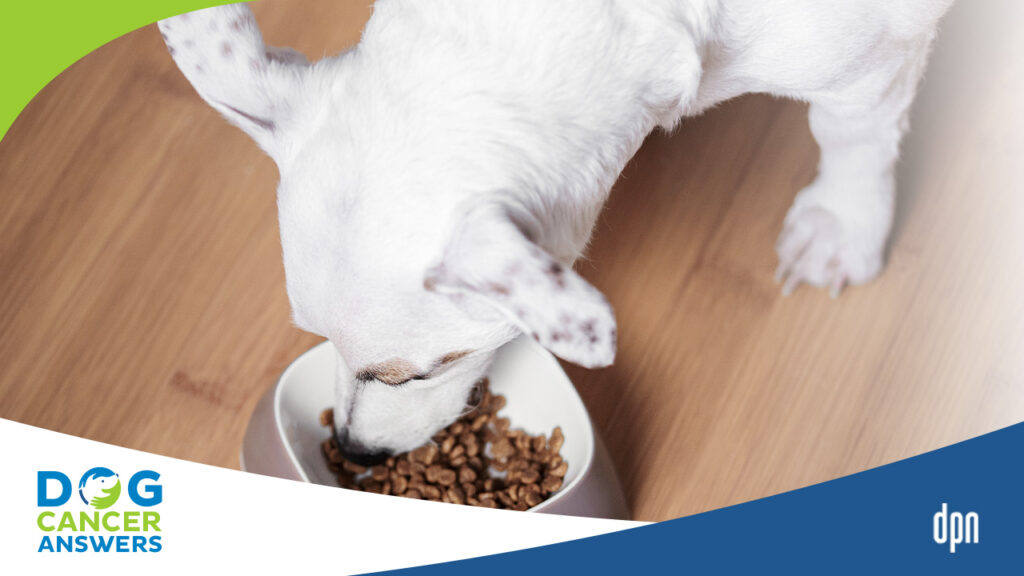A high-quality multivitamin can help bridge the gaps in nutritional needs missing from your dog’s diet, providing them with the metabolic and immune system support necessary to fight cancer.
Key Takeaways
- You should give your dog multivitamins if she is not getting a complete and balanced diet.
- You can give your dog multivitamins everyday as long as the product is intended for dogs and appropriate for your dog’s life stage and overall health.
- Your dog might need vitamins if she is having health issues, seems listless, or is not eating well. Talk to your veterinarian to determine if your dog is getting all the nutrients she needs.
- Dogs should start taking multivitamins if their diet is not complete and balanced.
- The benefits of multivitamins for dogs are making sure that your pup is getting all of the vitamins and minerals that she needs, especially if she isn’t eating a healthy diet.
Dogs Need Vitamins and Minerals
Vitamins and minerals are necessary for your dog to maintain normal and healthy bodily processes. Considerable biological damage can occur without them.1,2
The link between diet and cancer risk in humans and animals is becoming undeniable. Though complex and still not fully understood, the power of nutrition in reducing one’s likelihood of developing cancer has gained substantial ground within the scientific and medical community.3
In addition, nutritional strategies are being studied to provide optimal immune system and metabolic support during cancer treatments.3
Almost all commercially available over-the-counter diets for dogs meet the minimum nutrition amount guidelines as established by the Association of American Feed Control Officials (AAFCO).3
Federal Regulations on Animal Nutrition
While AAFCO does not directly approve or certify pet food, companies nonetheless analyze their product to ensure it meets the guidelines to meet nutritional profiles that other state or federal laws may require. Your dog’s food should have a label stating that it meets AAFCO guidelines on its packaging and a breakdown of ingredients.
Feeding your dog an age-appropriate AAFCO-approved food will give them all the nutrients required to maintain a healthy intake, including various vitamins and minerals.
What Are Multivitamins for Dogs?
However, when your dog is diagnosed with cancer, you may find yourself wanting to supplement their diet with a multivitamin. For example, maybe you want to take the reins on your dog’s nutrition and tailor it towards dietary strategies specific to helping fight canine cancer.
Or maybe your dog isn’t eating as much as they normally would be due to loss of appetite or other side effects that can result from cancer and cancer treatments. In either of these cases, a multivitamin helps ensure that your dog receives the nutrients they need.
Multivitamins are also extremely useful if you are feeding a homecooked diet. Homemade diets are notorious for having nutrient deficiencies, so adding a dog multivitamin will ensure your dog gets everything she needs to thrive.
Complementary therapies are becoming more and more mainstream in veterinary medicine. Supplements can help support your dog’s healing and ease their side effects.4 A good, high-quality multivitamin supplement can be a great addition to most canine cancer cases.4
Evidence for Efficacy
The purpose of a multivitamin is to compensate for nutritional needs not met through your dog’s intake of food.
This is particularly helpful when your dog has cancer, because vitamins and minerals are necessary for the function of their immune system and metabolism.
How much of each vitamin and mineral is needed highly varies from dog to dog, and is dependent on their overall health status, weight, age, and current levels of stress.1
Because of this, personalization is important and a generically made “catch-all” multivitamin may not be effective or provide the specific vitamins and minerals in the appropriate amounts that your dog needs.
Nutritional Deficiencies and Cancer
The relationship between vitamin and mineral deficiencies and cancer is extremely complex.2
Research in humans has found that a lack of iron, zinc, B12, B6, and Vitamin C can damage DNA.2 This is problematic because damaged DNA in particular genes that are involved with cell growth and proliferation may cause cancer to develop.
For example, deficiencies in folate, B6, and B12 cause compounds to incorporate themselves into strands of DNA, breaking them.2 A potentially similar mechanism may also exist in dogs.
Listen in as board-certified veterinary nutritionist discusses the importance of nutrition on DOG CANCER ANSWERS.
Supplements are Popular
If you’re thinking about adding a supplement such as a multivitamin to your dog’s cancer treatment plan, you’re not alone. A survey of dog owners grouped them into owners of dogs with cancer and owners of dogs without.6 The study found that owners whose dogs had cancer were more likely to feed them nutritional supplements than those whose dogs did not.
The owners of dogs who had cancer that were surveyed in the study reported 279 different kinds of supplements collectively. Of these, 23 (8%) of them were multivitamins. The sheer use of supplements in dogs with cancer, and the variety of multivitamins provided, maybe a testament to their efficacy as perceived by dog owners.
Multivitamin to the Rescue
Case studies have shown the ability of multivitamins to make up for the nutritional deficiencies that may accrue with at-home prepared diets tailored to treat canine diseases.
One such case study describes a 13-year-old Miniature Poodle who was given a list of foods to be fed by a holistic veterinarian to treat their polyuria (increased urination) and muscle fasciculation (muscle twitch).5 Unfortunately, the prescription failed to denote how much of each ingredient to put in, and the dog developed taurine deficiency and nutritional secondary hyperparathyroidism.
These deficiencies were corrected with a reformulated diet and the addition of a supplemental multivitamin, and the dog was free of their previous diagnoses within 16 weeks.
This example shows you how quickly an unbalanced diet can cause health issues — and how quickly correcting that deficiency may help.
Common Uses of Multivitamins for Dogs
Many factors play a role in what supplements will or will not be beneficial to your dog, but the general idea behind a multivitamin is to provide an adequate supply of vitamins and minerals to maintain optimal nutrition levels.1,4
In this respect, multivitamins are commonly used to:
- Help “fill in the gaps” that may be present in home-prepared diets.
- Overcome lack of food intake due to cancer or cancer treatment.
- Help lower the risk of healthy dogs developing cancer.
Though they can be effective and extremely helpful, home-prepared diets may not be nutritionally adequate on their own.3 In a study investigating 27 home-prepared recipes for dogs, none of them met the AAFCO or Recommended Amounts profiles for all essential nutrients.3
That being said, it is not impossible to build a diet that meets all your dog’s nutritional needs with the help of your veterinarian.1
Regardless of diet preparation, the nutrients in food won’t do your dog any good if they have difficulty eating, digesting, and passing food. Such symptoms can be common either due to the cancer itself, or the therapies commonly prescribed to treat it.
This is another instance where a multivitamin may be considered, because it packs a lot of nutrients in a smaller amount that your dog may have an easier time consuming.
Cancer in dogs is unfortunately a relatively common occurrence. While the causal connections between nutrients and cancer are complex, deficiencies of certain vitamins and minerals are continually being linked to particular metabolic issues observed in the cell that are known to increase cancer risk, such as the breaking of DNA strands.
Safety and Side Effects
Multivitamins may not be all they claim to be due to lack of industry regulation and oversight.1 They may contain fillers, could be contaminated with lead, or not accurately report the true amounts of each vitamin and mineral contained in a single unit.1
One way to put your mind at ease is to the call the manufacturer of the multivitamin you are thinking about trying and asking for a Certificate of Analysis.1 This will help verify the safety of the product, as well as the legitimacy and reputability of the brand.1
You can also read our article on choosing a good supplement.
As with any supplement, your dog may experience digestive upset and vomiting. For this reason, it’s recommended that you give your dog a bit a food to accompany the multivitamin.1
Using Multivitamins with Other Treatments and Supplements
You should always discuss with your veterinarian before adding, modifying, or eliminating any supplements from your pet’s cancer treatment regimen.4
You’ll want to let your vet know your dog’s baseline diet and any supplements currently being given to ensure that the addition of a multivitamin will not give your dog a toxic overdose.
A multivitamin can generally be used as an addition to your dog’s daily diet even if they are undergoing chemotherapy or radiation, as long as the multivitamin does not have a high level of antioxidants.8
Veterinary oncologist Dr. Sue Ettinger (Dr. Sue Cancer Vet) used to be skeptical about food's role in fighting cancer. Hear how her thinking has changed on DOG CANCER ANSWERS.
When to Not Use a Multivitamin for Dogs
High doses of antioxidants in multivitamins can be problematic because chemotherapy and radiation create a lot of free radicals.8 These free radicals are a good thing in this context, because they work to destroy cancer cells.8
However, antioxidants essentially feast on these free radicals, removing them before they can do their job, and this may ultimately reduce the effectiveness of chemotherapy and radiation.8 Note that you don’t need to avoid antioxidants altogether. Your dog still needs antioxidants, just not high doses. The amounts that are already in your dog’s regular diet are fine.1,8
It may be best to consult with a holistic veterinarian in addition to your veterinary oncologist when discussing and choosing a multivitamin for your dog with cancer. Holistic (usually called integrative) veterinarians may have greater knowledge on how natural supplements could interact with one another, and which are more important or most helpful for fighting cancer.8
In the case of multivitamins, too much of a good thing can be detrimental to your dog. A multi-vitamin may not be needed if your dog is already getting their nutritional needs met through their current diet.1 Instead, you run the risk of exceeding recommended limits and introducing toxic levels of vitamins and minerals into your dog’s system.
How to Give a Multivitamin to Your Dog
Canine multivitamins can be purchased online, at your veterinarian’s office, or in the pet store.1
They come in multiple forms, giving you some flexibility to choose what might work best for your dog. Multivitamins can be found as soft chews, wafers, tablets, liquids and gels, powders, or in solid tablets, capsules, or softgels.
Opening capsules or grinding tablets and then sprinkling or disguising the subsequent powder in your dog’s food may be helpful if your dog will not take the multivitamin whole.1
You may come across some tips and tricks depending on the vitamins and minerals that dominate the multivitamin your veterinarian suggests for your dog. For example, oil-soluble vitamins, such as Vitamins A, D, K, and E, will absorb better into your dog’s digestive tract if consumed with food with some fat.1
You must follow the Recommended Daily Allowance levels set for dogs by the AAFCO.1 Like the AAFCO’s role in ensuring that dog food is nutritionally adequate, the same is done for supplements such as multivitamins.
If a multivitamin is legitimate and designed for dogs, then the amounts listed on the label very likely adhere to the guidelines set out by the AAFCO.1 You can safely follow the instructions as directed by the product or consult with your vet.1 Dosage will likely depend on your dog’s weight.
Don’t forget that AAFCO also considers age when outlining nutritional requirements. This is because nutritional requirements change as dogs get older,2 so be sure that what you’re providing to your dog is age appropriate.
What If I Miss a Dose?
If you remember soon after the dose is missed, then you can give the missed dose to your dog a little later than usual.
However, if it is close to the time the next multivitamin will be given, skip that dose and continue with your normal schedule.
Do not “double dose” your dog to make up for skipped doses. This is especially important with multivitamins since they can reach toxic levels to your dog.
Storage and Handling
Store in accordance with the instructions on your particular product. Some brands suggest storing it at room temperature, while others suggest keeping the multivitamin in the refrigerator.
Due to the risk of toxicity, keep the multivitamin container out of your dog’s reach. They may consider it a treat and eat too many.
You should only give dog multivitamins to dogs. Dog multivitamins are specially formulated for canine consumption and not for other animals. The same goes for human multivitamins – don’t share your multivitamin with your dog.
Our Take on Multivitamins for Dogs
A general, high-quality multivitamin can help ensure maintenance levels of nutritional support for dogs with cancer.
However, a “catch-all” multivitamin may not meet your dog’s specific needs. It is likely more effective to focus on providing your dog with a balanced and complete diet that provides them with the vitamins, minerals, and nutrients best suited to help them fight their cancer.
If your dog is missing or coming up short on important nutrients, a multivitamin from a reputable company can make a big difference. We suggest consulting with your veterinarian or a veterinary nutritionist before adding a multivitamin, as this will be key in determining the multivitamin that’s best for supporting your dog’s metabolic function and boosting your dog’s immunity.
- Dressler D, Ettinger S. The Dog Cancer Survival Guide. Maui Media LLC. Maui, Hawaii. 2011.
- Ames BN, Wakimoto P. Are vitamin and mineral deficiencies a major cancer risk? Nat Rev Cancer. 2002;2:694-704.
- Heinez CR, Gomez FC, Freeman LM. Assessment of commercial diets and recipes for home-prepared diets recommended for dogs with cancer. J Am Vet Med Assoc. 2012;241(11):1453-1460.
- Osborne C. Dog Cancer: Canine Lymphoma: Complementary Therapies. Chagrin Falls Veterinary Center & Pet Clinic. 2020. Accessed November 22, 2022. https://www.chagrinfallspetclinic.com/2012/06/01/dog-cancer-canine-lymphoma-complementary-therapies/.
- Shmalberg J. Nutritional secondary hyperparathyroidism and taurine deficiency in a dog fed a home-prepared diet during Chinese food therapy. Am J of Tradit Chinese Vet Med. 2013;8:69-72.
- Bianco AV, Abood S, Mutsaers A, Woods JP, Coe JB, Verbrugghe A. Unconventional diets and nutritional supplements are more common in dogs with cancer compared to health dogs: An only global survey of 345 dog owners. Vet Comp Oncol. 2020;18:706-717.
Topics
Did You Find This Helpful? Share It with Your Pack!
Use the buttons to share what you learned on social media, download a PDF, print this out, or email it to your veterinarian.









